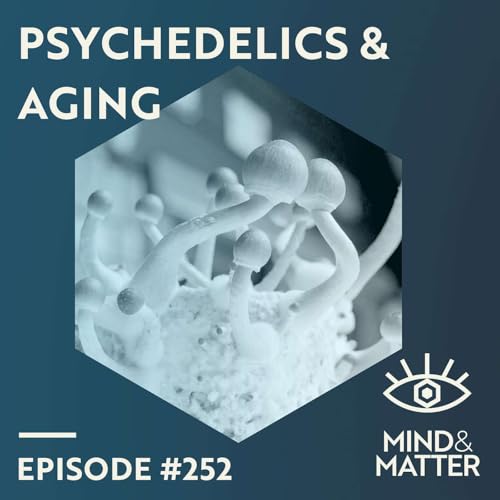
Scarring, Fibrosis, Oxidative Stress, and Psilocybin & Aging | Louise Hecker | 252
Échec de l'ajout au panier.
Échec de l'ajout à la liste d'envies.
Échec de la suppression de la liste d’envies.
Échec du suivi du balado
Ne plus suivre le balado a échoué
-
Narrateur(s):
-
Auteur(s):
À propos de cet audio
Send us a text
Aging, tissue repair, and the longevity benefits of psilocin.
Episode Summary: Dr. Louise Hecker discusses her research on tissue repair and regeneration, explaining how fibroblasts drive wound healing by forming scar tissue but fail to resolve properly with age, leading to fibrotic diseases like pulmonary fibrosis and liver cirrhosis; they discuss aging hallmarks such as oxidative stress and telomere shortening, and highlight Hecker's study showing psilocybin's active metabolite, psilocin, extends cellular lifespan in lab cultures by reducing oxidants and preserving telomeres, while monthly doses in aged mice improved appearance and survival rates.
About the guest: Louise Hecker, PhD is an Associate Professor of Medicine at Baylor College of Medicine, specializing in repair and regeneration processes, particularly in aging and fibrotic diseases.
Discussion Points:
- Fibroblasts are dormant cells that activate during injury to pull wounds closed and form scars, then de-differentiate or die; aging impairs this, causing persistent scarring and disease.
- Aging reduces the body's regenerative capacity; different organs vary in repair efficiency, with skin healing better than heart tissue.
- Oxidative stress, like "rust" in the body, accumulates with age due to imbalanced reactive oxygen species production and antioxidant defenses, contributing to cellular damage.
- Telomeres act as protective DNA caps that shorten with cell divisions, serving as a hallmark of biological aging; sirtuins are master regulators influencing aging processes.
- Hecker's in vitro study showed psilocin dose-dependently extended fibroblast lifespan by 29-50%, lowering oxidative stress below young cell levels and preserving telomeres.
- In aged mice (equivalent to 60-65 human years), monthly high-dose psilocybin (15 mg/kg) led to healthier appearance, regrown fur, and 80% survival when controls reached 50% mortality after 10 months.
- Psilocybin's effects may stem from serotonin receptors expressed in many cell types beyond the brain, suggesting broader anti-aging potential; future work explores mechanisms, optimal dosing, and applications for age-related diseases.
- Fungi like magic mushrooms represent an under-explored "kingdom" for medicine, with psilocybin's durable effects hinting at systemic impacts on aging.
Reference Paper:
- Study: Psilocybin treatment extends cellular lifespan and improves survival of aged mice
Related content:
Support the show
Affiliates:
- Seed Oil Scout: Find restaurants with seed oil-free options, scan food products to see what they’re hiding, with this easy-to-use mobile app.
- KetoCitra—Ketone body BHB + electrolytes formulated for kidney health. Use code MIND20 for 20% off any subscription (cancel anytime)
- Lumen device to optimize your metabolism for weight loss or athletic performance. Code MIND for 10% off
- SiPhox Health—Affordable at-home blood testing. Key health markers, visualized & explained. Code TRIKOMES for a 20% discount.
For all the ways you can support my efforts


